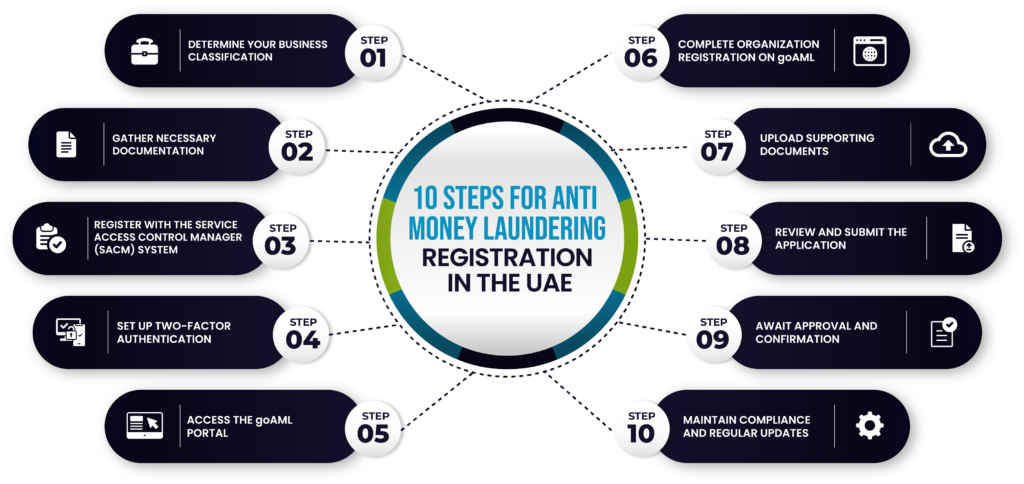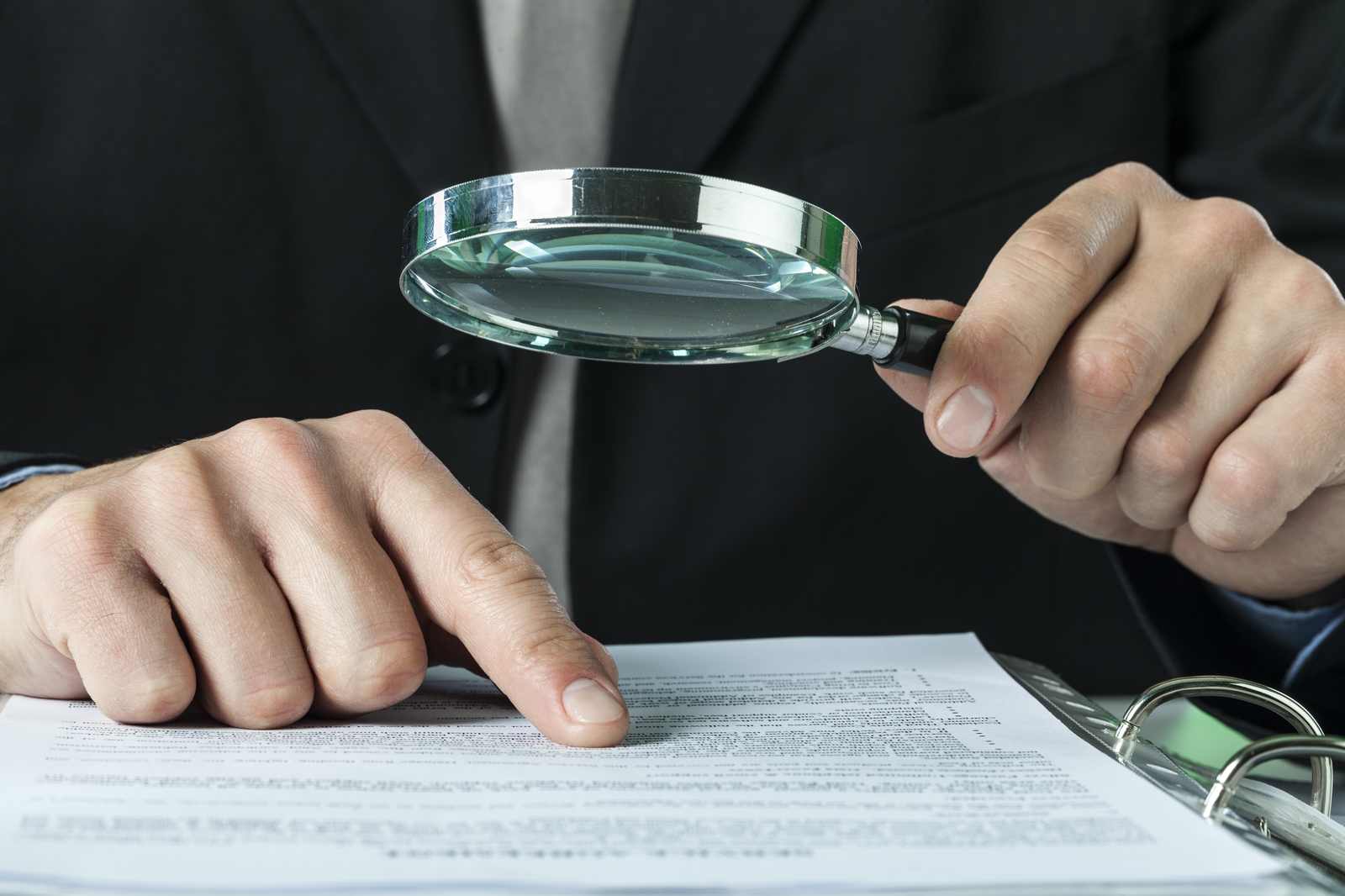10 Steps for Anti Money Laundering Registration in the UAE

In the United Arab Emirates (UAE), combating money laundering is a top priority. The UAE has stringent regulations for businesses operating within its borders.
That’s why compliance with Anti-Money Laundering (AML) laws is mandatory, particularly for Designated Non-Financial Businesses and Professions (DNFBPs).
These DNFBPs include real estate agents, dealers in precious metals and stones, auditors, accountants, and legal professionals.
Similarly, companies can register with the UAE’s Financial Intelligence Unit (FIU) through the United Nation’s goAML portal.
In this blog post we are going to provide 10 steps for anti money laundering registration in the UAE.
Understanding the Importance of AML Registration

The UAE is implementing strict AML regulations to prevent any sort of financial crimes inside its financial system.
UAE’s Federal Decree-Law No. 20 of 2018 and Cabinet Decision No. 10 of 2019 mandate that companies have procedures in place to report suspicious transactions.
Secondly, the United Nation’s goAML portal is a platform for filing Suspicious Transaction Reports (STRs) and Suspicious Activity Reports (SARs).
This works as a bridge between reporting entities and the FIU. Failure to register on goAML may result in severe penalties imposed by the Ministry of Economy.
Step 1: Determine Your Business Classification
Before initiating the registration process, ascertain where your business falls under the DNFBP category.
- Real estate brokers/agents dealing with property transactions.
- Accountants providing professional financial services.
- Dealers in precious metals and gemstones.
- Lawyers, notaries, and other legal professionals.
If your business falls under any of these categories then AML registration is mandatory.
Step 2: Gather Necessary Documentation
In the next for anti money laundering registration in the UAE, you’ll need to prepare the following documents for the registration process:
- A copy of your company’s trade or commercial license.
- An authorization letter from your institution.
- Copies of the passport, residence visa, and Emirates ID of the compliance officer or authorized individual.
All of the documents should be up-to-date to prevent delays during registration.
Step 3: Register with the Service Access Control Manager (SACM) System
The registration process begins with the SACM system.
- Access the registration page.
- Complete the registration form, providing details such as your license number, contact information. You’ll also need to attach the necessary documents in PDF format.
- Agree to the goAML Portal Service Terms and Conditions.
- Submit the form.
Upon submission, you will receive an email containing an OTP. You’ll also get a URL to access your username and secret code for setting up two-factor authentication
Step 4: Set Up Two-Factor Authentication
The goAML has strong security systems, necessitating two-factor authentication:
- Download the ‘Google Authenticator’ application on your mobile device.
- Use the code provided in the SACM registration email to set up the authenticator.
- The application will generate a different code every minute, which will serve as your password for accessing the goAML portal.
Step 5: Access the goAML Portal
With two-factor authentication in place:
- Go to the goAML portal.
- Log in using your SACM username and the current code from the Google Authenticator app.
This will grant you access to the goAML system, where you can proceed with the organization registration.
MHR services includes Audit & Assurance, Financial Accounting, Financial & Business Advisory, Taxation including VAT, Corporate Tax & Excise Tax, Company Setup, regulatory & compliance and Management Consultancy.
Step 6: Complete Organization Registration on goAML
Within the goAML portal:
- Select ‘Register a new Organization.’
- Fill out the registration form, providing detailed information about your organization, including:
- Legal name and trade name.
- Type of business and DNFBP category.
- Physical address and contact details.
- Details of the compliance officer, including contact information and identification documents.
Step 7: Upload Supporting Documents
As part of the anti money laundering registration:
- Upload the previously gathered documents, such as the trade license and identification documents of the compliance officer.
- Check that all documents are clear, legible, and in the specified format.
Step 8: Review and Submit the Application
Before submission:
- Carefully review all entered information and uploaded documents.
- Confirm that all mandatory fields are completed.
- Submit the registration application.
After submission, you will receive a confirmation email acknowledging receipt of your application.
Step 9: Await Approval and Confirmation
After submitting your registration application, the UAE Financial Intelligence Unit (FIU) will review your submission.
This process may take several days. Upon approval, you will receive a confirmation email, granting you access to the goAML system.
This email will include your goAML organization identity number (Org ID), which serves as your unique identifier within the system.
Lastly, you’ll need to monitor your email regularly to promptly respond to any requests for additional information or clarification.
Step 10: Maintain Compliance and Regular Updates
Once registered, your organization is obligated to:
- Designate a Compliance Officer: Appoint a qualified individual responsible for overseeing AML compliance within your organization.
- Implement AML Procedures: Create robust systems for reporting suspicious transactions and activities.
- Regularly Update Information: Keep your organization’s information current in the goAML system.
- Submit Reports Timely: See if the Suspicious Transaction Reports (STRs) and Suspicious Activity Reports (SARs) are filed promptly when necessary.
Consequences of Non-Compliance

Failure to register on the goAML portal or to comply with AML regulations can result in severe penalties, including fines ranging from AED 50,000 to AED 1 million.
Additionally, non-compliant entities may face operational restrictions. Therefore, it is imperative for all Designated Non-Financial Businesses and Professions (DNFBPs) to complete the registration process promptly.
FAQs
The goAML portal is an integrated platform developed by the UAE Financial Intelligence Unit (FIU) for filing Suspicious Transaction Reports (STRs) and Suspicious Activity Reports (SARs).
Registration on this portal is mandatory for Designated Non-Financial Businesses and Professions (DNFBPs) to report suspicious activities, as stipulated by Federal Decree Law No (20) of 2018 and Article 20(2) of Cabinet Decision No (10) of 2019.
All DNFBPs operating in the UAE are required to register on the goAML portal. This includes entities such as real estate agents, dealers in precious metals and stones, lawyers, notaries, accountants, and company service providers. Non-registration can lead to severe penalties imposed by the Ministry of Economy.
The registration process is a two-stage procedure:
- Stage 1: Register in the Service Access Control Manager (SACM) system of the UAE FIU to obtain a username and a secret key for accessing Google Authenticator.
Stage 2: Complete the registration on the goAML portal by providing information about your organization and appointing a Compliance Officer.
During registration, you will need to provide:
- Details about your organization, including its legal name, trade name, and contact information.
- Information about the appointed Compliance Officer, such as their qualifications and contact details.
- Details of the organization’s ownership structure and any relevant licenses or permits.
After registration, it’s crucial to:
- Implement robust internal policies and procedures for detecting and reporting suspicious activities.
- Conduct regular training for staff to raise awareness of AML obligations.
- Maintain accurate and up-to-date records of all transactions and reports.
- Regularly review and update your AML practices to align with any changes in regulations.
- Staying informed about the latest AML laws and guidelines is essential for ongoing compliance.
Conclusion
That’s a wrap for the 10 steps for anti money laundering registration in the UAE.
Registering with the goAML portal is necessary for businesses in the UAE to fulfill their obligations under the country’s Anti-Money Laundering laws.
By following these steps, organizations contribute to the integrity of the financial system. They help combat financial crimes such as money laundering and terrorist financing.
Lastly, given the complexities involved, it is advisable to consult with legal professionals who are aware of the UAE’s financial regulations.













